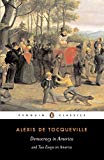
Democracy in America is an examination of American society by the French political philosopher, Alexis de Tocqueville. The two-volume work examines the continual progress of democracy and equality over the past seven hundred years and attempts to explain why the republican form of government in the US has lasted so long. Tocqueville discusses equality, the middle class, national sovereignty, both the constraints and relative freedom of American women, the separation of church and state and threats to American democracy.
Tocqueville begins his study of America by explaining the contribution of the Puritans. According to him, the Puritans established America's democratic social state of equality. They arrived equals in education and were all middle class. In addition, Tocqueville observes that they contributed a synthesis of religion and political liberty in America that was uncommon in Europe, particularly in France. He calls the Puritan Founding the "seed" of his entire work.
Tocqueville believed that the Puritans established the principle of sovereignty of the people in the Fundamental Orders of Connecticut. The American Revolution then popularized this principle, followed by the Constitutional Convention of 1787, which developed institutions to manage popular will. While Tocqueville speaks highly of the America's Constitution, he believes that the mores, or "habits of mind" of the American people play a more prominent role in the protection of freedom.
Tocqueville was one of the first social critics to examine the situation of American women and to identify the concept of Separate Spheres. The section Influence of Democracy on Manners Properly So Called of the second volume is devoted to his observations of women's status in American society. He writes: "In no country has such constant care been taken as in America to trace two clearly distinct lines of action for the two sexes and to make them keep pace one with the other, but in two pathways that are always different."
He argues that the collapse of aristocracy lessened the patriarchal rule in the family where fathers would control daughters' marriages, meaning that women had the option of remaining unmarried and retaining a higher degree of independence. Married women, by contrast, lost all independence "in the bonds of matrimony" as "in America paternal discipline [by the woman's father] is very relaxed and the conjugal tie very strict".
Because of his own view that a woman could not act on a level equal to a man, he saw a woman as needing her father's support to retain independence in marriage. Consistent with this limited view of the potential of women to act as equals to men, as well as his apparently missing on his travels seeing the nurturing roles that many men in the United States played, particularly in the Delaware Valley region of cultures where there was a lot of influence by Society of Friends as well as a tradition of male and female equality, Tocqueville considered the separate spheres of women and men a positive development, stating:
"As for myself, I do not hesitate to avow that although the women of the United States are confined within the narrow circle of domestic life, and their situation is in some respects one of extreme dependence, I have nowhere seen women occupying a loftier position; and if I were asked, (...) to what the singular prosperity and growing strength of that people ought mainly to be attributed, I should reply,—to the superiority of their women."
Already have an account? Log In Now